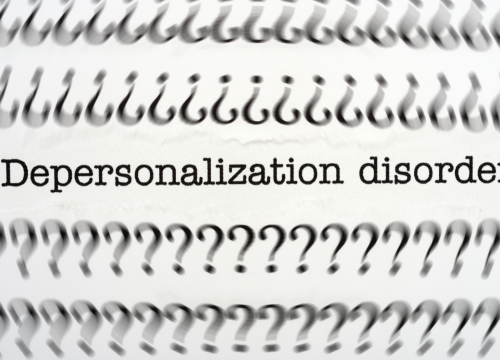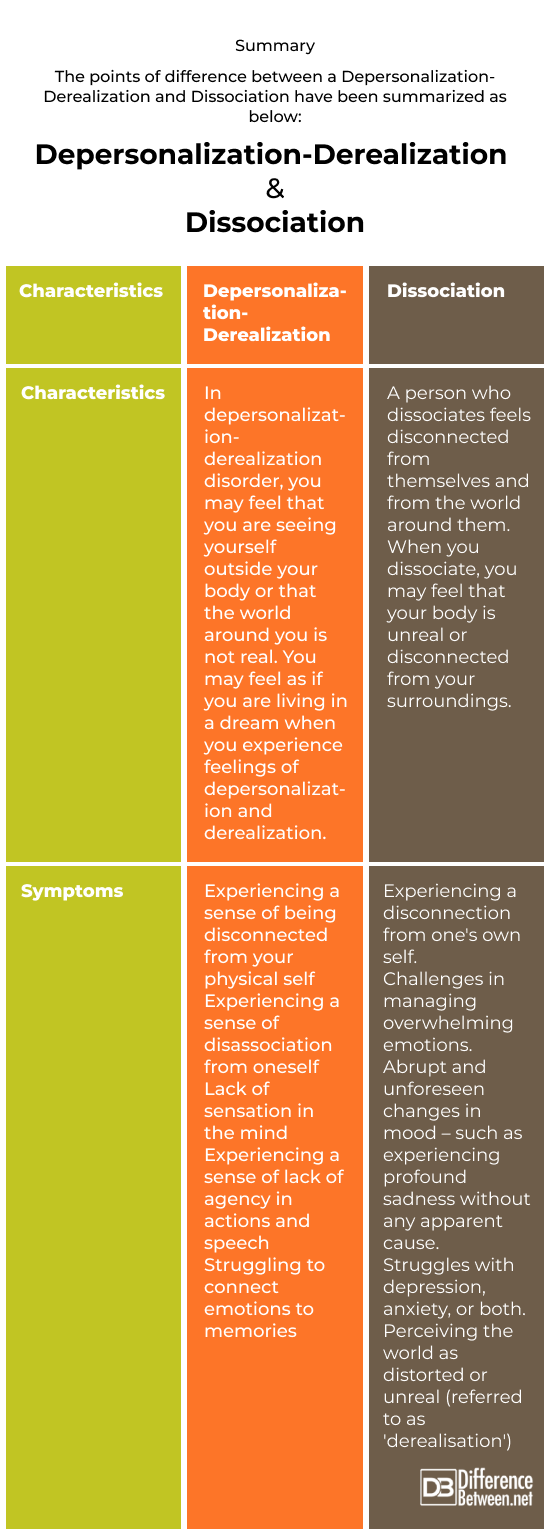Difference Between Depersonalization-Derealization and Dissociation
Depersonalization-derealization disorder and dissociation are psychological issues. There is a disconnection between various domains of consciousness, perception and identity.
Depersonalization-derealization disorder is a specific diagnosis described by persistent and distressing experiences of depersonalization and/or derealization.
Depersonalization refers to the sense of separation from oneself, as if observing one’s thoughts, emotions, and actions from a distance. Whereas derealization happen when someone has a feeling of unreality or detachment from the external world. This disorder can display as a symptom of other mental health conditions.
Dissociation, as a broader term, consist of a range of experiences where there is a disruption in the incorporation of consciousness, identity, perception and memory.
Individuals with depersonalization-derealization disorder often describe themselves of having a feeling as though they are living in a fog.
Therefore, psychiatric disorder Depersonalization-Derealization Disorder consists of persistent feelings of depersonalization and derealization. On the other hand, dissociation is a more general term that encompasses a wide range of mental processes that disconnect the mind from consciousness, identity, or memory. Not all dissociative experiences involve depersonalization or derealization, even though they can be considered types of dissociation.
Similarity
Dissociation includes depersonalization. A feeling of detachment, particularly from oneself and one’s identity, is described as part of depersonalization. In addition, it is associated with derealization, a state of altered perception or separation from one’s surroundings.

Then, what is Depersonalization-Derealization?
Depersonalization disorder, also called depersonalization-derealization disorder or DDD, is a form of dissociative disorder. It affects a person’s self-perception, while also impacting their perception of others and their surroundings. Those experiencing depersonalization may feel disconnected from reality, perceiving themselves as unreal or their environment as unreal. They may even enter a dream-like or detached state, observing their own body from an external perspective. It’s worth noting that depersonalization can be symptomatic of various other conditions, such as substance abuse, personality disorders, or brain diseases.

What is Dissociation?
Dissociation refers to the psychological process of separating oneself from personal emotions, thoughts, memories, or one’s own sense of identity. When one undergoes dissociation, there is a sense of detachment from oneself and the people in their surroundings. One may perceive themselves as being outside of their physical body or question the reality of the world around them. Dissociation is a coping mechanism employed by the mind to manage excessive stress or trauma. Many individuals encounter dissociation at some point in their lives. Those who experience a traumatic event (such as abuse, accidents, or war) often experience some level of dissociation during or after the event. The feeling of dissociation can persist for several days or even weeks. Each person may encounter dissociation in unique ways. In most cases, dissociation naturally resolves without requiring medical intervention. However, certain individuals may develop dissociative disorders and necessitate medical assistance to overcome them.
Difference between Depersonalization-Derealization and Dissociation
Depersonalization-Derealization
Depersonalization refers to a subjective sensation where an individual perceives a sense of detachment or disconnection from their own physicality, cognitions, and sentiments. They may perceive themselves as an external observer of their own being.
Derealization entails an impression of unreality or disengagement from the external world. Individuals experiencing derealization may perceive their surroundings as distorted, reminiscent of a dream, or artificial.
People with Depersonalization-Derealization Disorder frequently encounter both depersonalization and derealization. These indications can be enduring and impede with everyday functioning.
Dissociation
Dissociation is a broader concept that encompasses a variety of encounters involving a separation between thoughts, identity, consciousness, and memory. It serves as a defensive mechanism that the mind employs to cope with stress, trauma, or overwhelming circumstances.
Dissociation can manifest in diverse manners, such as amnesia (memory loss), identity perplexity, identity modification (having distinct “parts” or “alters”), and a perception of disconnection from one’s emotions or experiences.
Summary
The points of difference between a Depersonalization-Derealization and Dissociation have been summarized as below:

FAQ:
How do I know if I’m dissociating?
The following are some of the signs of dissociation:
- Certain time periods, events, and personal information may slip your mind
- Disconnection from your own body
- Feeling distant from your surroundings
- You can be unsure about who you are
- You may have several distinct identities
What are the 4 types of dissociation?
The four dissociative disorders are: Dissociative Fugue, Dissociative Amnesia, Depersonalization Disorder, and Dissociative Fugue.
How to tell the difference between depersonalization and Derealization?
In depersonalization, you feel detached from yourself and observe your own thoughts or actions from a distance. A person who is derealized may describe their external surroundings as unclear, lifeless, or foggy. This is a state in which people often feel like the world around them isn’t real.
Do I have dissociation derealization?
Dissociation occurs when a person feels separated from their surroundings, as if the environment is unreal or twisted. Derealization is a type of dissociation in which an individual feels separated from their surroundings, as if they are unreal.
Am I dissociating or depersonalizing?
Dissociation refers to a psychological condition wherein an individual experiences a disconnection from their thoughts, emotions, recollections, or identity. It can manifest in various forms, including a sense of detachment from reality, memory loss, or a distorted perception of time.
Depersonalisation, on the other hand, is a type of dissociation characterized by a feeling of estrangement from one’s own physical being or a perception of unreality regarding oneself. It may involve perceiving oneself as an external observer of one’s own thoughts, emotions, or physicality.
How do you snap out of dissociation?
- A mindful walk
- Breathe slowly
- Make use of your Five Senses. Name five things you see, four things you feel, three things you hear, two things you smell, and one item you taste
- Keep a daily journal
- Difference Between Global Warming and Greenhouse Effect - May 18, 2024
- Difference Between Vaccination and Immunization - March 3, 2024
- Difference Between Selective Mutism and Autism - February 25, 2024
Search DifferenceBetween.net :
Leave a Response
References :
[0]Choi, K. R., Seng, J. S., Briggs, E. C., Munro-Kramer, M. L., Graham-Bermann, S. A., Lee, R. C., & Ford, J. D. (2017). The dissociative subtype of posttraumatic stress disorder (PTSD) among adolescents: Co-occurring PTSD, depersonalization/derealization, and other dissociation symptoms. Journal of the American Academy of Child & Adolescent Psychiatry, 56(12), 1062-1072.
[1]Lemche, E., Surguladze, S. A., Brammer, M. J., Phillips, M. L., Sierra, M., David, A. S., ... & Giampietro, V. P. (2016). Dissociable brain correlates for depression, anxiety, dissociation, and somatization in depersonalization-derealization disorder. CNS spectrums, 21(1), 35-42.
[2]Yang, J., Millman, L. M., David, A. S., & Hunter, E. C. (2023). The prevalence of depersonalization-derealization disorder: a systematic review. Journal of Trauma & Dissociation, 24(1), 8-41.
[3]Image credit: https://www.canva.com/photos/MAD2adafL4g-depersonalization-disorder/
[4]Image credit: https://www.canva.com/photos/MAFlNtmRIhk-man-with-mental-disorder/
